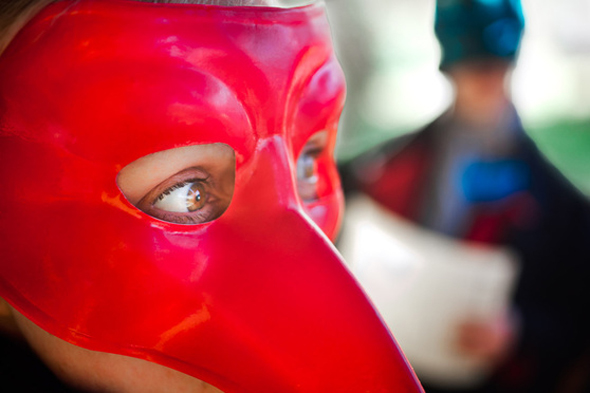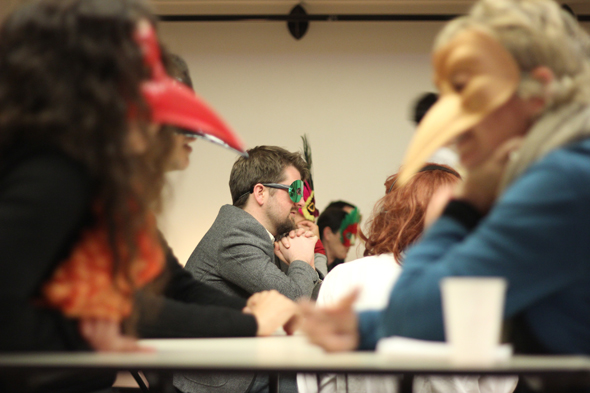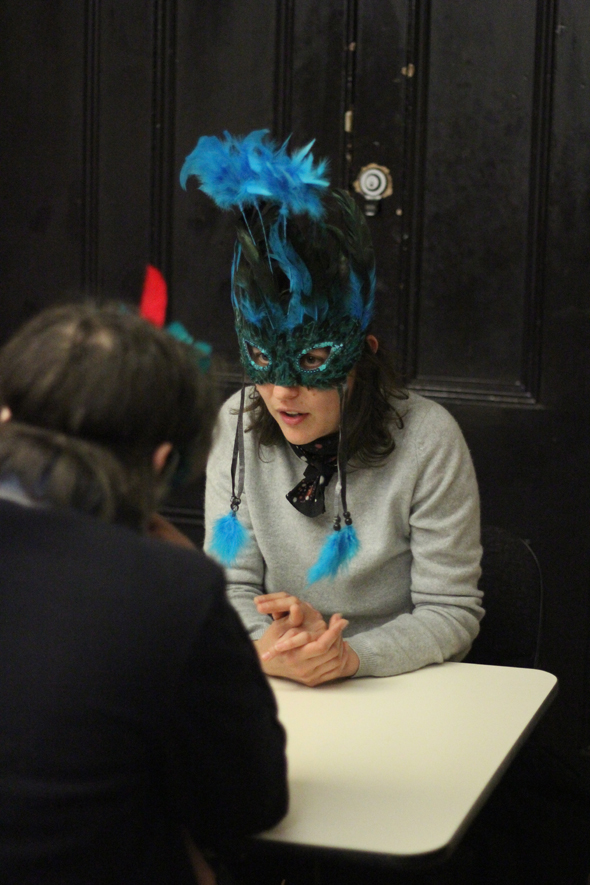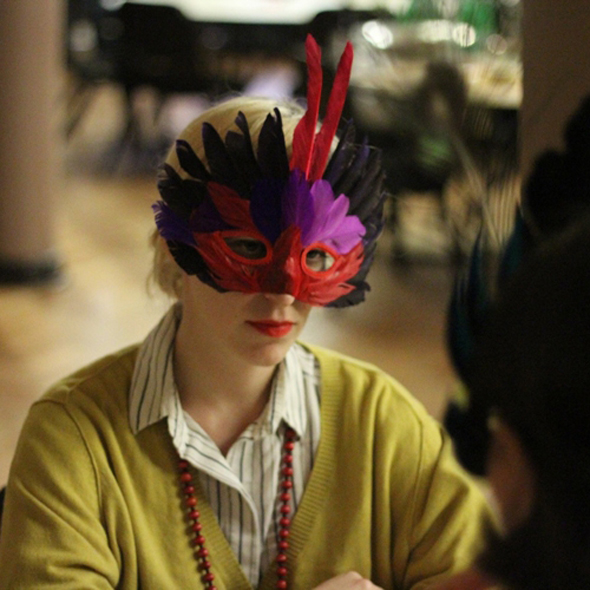by Elizabeth Feder // Nov. 5, 2011
Who do you become when a stranger is listening? triage live art collective explores this question thoroughly with their new participatory installation work, Strange Passions, as a part of Die Fabrikanten’s Exchange Radical Moments! Live Art Festival. Hailing from Melbourne, Australia, triage is currently in Berlin to participate in the festival’s dynamic program of free live art events, and to present this new project, which premieres on 11.11.11. While the festival will be hosting events in cities across Europe, I was able to sit down in Berlin with Katerina Kokkinos-Kennedy and Melanie Jame Walsh from triage to learn more about Strange Passions, the collective, and the complexities of their live art language.
 triage live art collective’s Strange Passions. Image courtesy of triage live art collective, 2011
triage live art collective’s Strange Passions. Image courtesy of triage live art collective, 2011
Interview
ELIZABETH FEDER: The word “participatory” is a loaded one for a lot of audiences. What does this mean for the experience of Strange Passions?
MELANIE JAME WALSH: Well, the work we make is very social, very relational. We are interested in creating scenarios in which strangers encounter one another in ways that are ultimately surprising, playful and open. In Strange Passions, people can expect to be waited on by the good sisters of triage as they meet with a stranger to dine on a conversation menu of passionate topics. They can expect to enjoy themselves and to enjoy exploring the possibilities of anonymity and intimacy. To take part in Strange Passions, you reserve your place by either registering online (11moments.org/passions) or by coming to one of the two venues (WAU @ HAU2 or Kunstfabrik am Flutgraben) on the day of the event. Each Strange Passions session will last 40 minutes. You will be greeted by triage, who will offer a selection of masks. Once you’ve chased your specific anonymity, you are then seated at a table for two where you encounter another masked stranger. We then serve the two of you from conversation menus, which offer a range of questions on the topics of sex, love & death. The rest is up to you.
KATERINA KOKKINOS-KENNEDY: The event encourages the audience to feast on words and on one another’s presence– and to trust that you can create your own intimacy or event. You can expect bilingual comedy (I’m learning German, but it’s very slow), human warmth, and a desire to facilitate meaningful conversations under strange conditions. Overall, expect the pleasures of play, challenge and discovery with a fellow stranger.
 triage live art collective’s Strange Passions. Image courtesy of triage live art collective, 2011
triage live art collective’s Strange Passions. Image courtesy of triage live art collective, 2011
With the idea of bi-lingual events in mind: you are an English-speaking live art collective, and Strange Passions is inherently a conversation-based project – is it more of a struggle to participate in languages other than English?
MJW: Not at all. The show has been devised as a trans-lingual event, and it’s definitely possible to participate in at least English and German. We have bilingual conversational menus and are getting our tongues around a whole bunch of German phrases to use as the wait-staff. In getting the opportunity to present our work in a country outside of the imperial English domain, we’ve been able to ask ourselves some really challenging questions about where we might take our work next. Making trans-lingual work is increasingly appealing to us, and it pushes our foundational interests in the social and relational, in addition to the possibilities for connection between strangers on a new level. It’s very exciting for us and we can’t wait to see where it goes. This opens up a whole new approach to our projects and where we’re heading conceptually as a collective, which is focused on making works for strangers around the world.
How fundamentally challenging is it to open one’s self up to intimacy with a stranger? It sounds as if this work is really about anonymous-intimacy.
KKK: Yes, intimacy is at the core of all our projects, and Strange Passions in particular. Early in the making of the project, we realized that half masks allowed people to express their passions and to reveal deeper aspects of themselves in the conversational exchange. We decided to use the mask as the starting point of the event as a formal way of giving ourselves ‘permission’ to open up in a different way. In choosing a mask, and feeling protected by it, participants find that they are able to disclose very personal things. This also appealed to us because of the way it corresponds to the lineage of mask in performance and to the larger notion of conceptual masks and personas in our everyday lives.
MJW: It’s always about finding that line in our work, between the performed and the non-performed, the theatrical and the heightened everyday. No matter how invisible we, as the ‘performers’, are in any of our works there is always diligent attention paid to the dramaturgy and to the shape of an event. It’s about creating several tracks for audiences to travel along so that the participant’s experience is facilitated.
 triage live art collective’s Strange Passions. Image courtesy of triage live art collective, 2011
triage live art collective’s Strange Passions. Image courtesy of triage live art collective, 2011
In speaking of ‘the collective’, who, or what, is triage live art collective? How did you begin, where have you been and where are you going?
KKK: I think that forming triage was in part a response to the sense that there needs to be a cultural language that falls somewhere between theatre and performance art. Something that meets people where they are in the so-called everyday world, and yet is potentially extraordinary.
MJW: Katerina and I had worked together on several projects in 2008-2009. Both of us had very strong performance backgrounds; I as a performer-singer, Katerina as a director, dramaturge and actor trainer. We felt that with our combined skills, an unusually rich collaborative dynamic and with such closely aligned aesthetic and creative ambitions we just had to form the collective.
KKK: My expertise is in classical and devised theatre. Yet I’ve found myself increasingly drawn to experimenting with the role of the audience. In live art, the event occurs more explicitly between performers and participants rather than in just what the actors do on stage. In a lot of theatre the dangerous/challenging space of discovery is well & truly dead or tamed by the time the work is presented on stage. This always disappoints me. Live art offers a rough, messy and sustainable practice; we can create something wonderful with very few resources and it can travel easily. I have a lot of time for these qualities. Triage has a number of works planned for 2012 and we’ve invited several Berlin collaborators to join us. Being in Berlin has been exciting for us in terms of meeting artists interested in this kind of work.
MJW: I am now based in Berlin which can only enrich our investigation of the trans-lingual and the trans-national aspects of our work. triage will continue to develop projects in this vein for a long, long time. We really enjoy working together – almost too much. I’m also establishing a stronger solo practice, moving particularly into video and sound within a participatory and more explicitly performative framework.
KKK: 2012 is going to be a good year for us.
 triage live art collective’s Strange Passions. Image courtesy of triage live art collective, 2011
triage live art collective’s Strange Passions. Image courtesy of triage live art collective, 2011
___________________________________________________________________________________
Additional Information
Exchange Radical Moments! Live Art Festival
Strange Passions – TRIAGE LIVE ART COLLECTIVE
Friday, Nov. 11, 2011; 11-2 pm, 3-6 pm, 7-10 pm
Hebbel am Ufer – Wirstshaus WAU (click here for map)
& Kunstfabrik am Flutgraben (click here for map)
Register at strangepassions@triageliveartcollective.com with your name, preferred venue and time of availability
See more of triage live art collective’s work:
triageliveartcollective.com
Exchange Radical Moments! Live Art Festival
DIE FABRIKANTEN Produktion
Promenade 15
4020 LINZ/AUSTRIA
___________________________________________________________________________________
Elizabeth Feder is an architect and writer from New York City currently based in Berlin. She received her BArch from The Cooper Union for the Advancement of Science and Art and recently completed her research project entitled, “Between Transience and Permanence: a New Reactivation of the Berlin Block” with the Deutscher Akademischer Austausch Dienst.




















